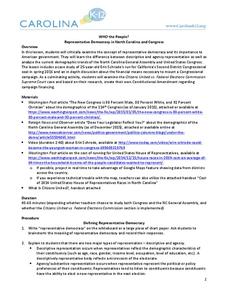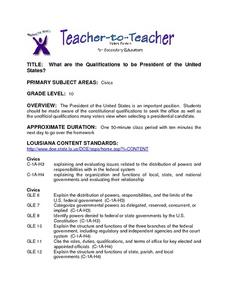Curated OER
iCivics: State Government
Students explore the role of state government. In this civics lesson, students play an online game that requires them to consider the needs of state residents and the structure of state government.
Curated OER
Judicial Branch & Supreme Court Questions
In this U. S. government instructional activity, students respond to 19 short answer questions about the responsibilities of Supreme Court members in the United States.
Administrative Office of the US Courts
Nomination Process
"I do solemnly swear that I will support and defend the Constitution of the United States..." Scholars investigate the nomination process of Supreme Court justices when assuming office. Through examination of primary and secondary...
C-SPAN
Voting Discrimination and the Effects of Shelby County v. Holder
Show learners that every vote counts as they debate the federal government 's role in protecting voting rights in historically racially discriminated areas. In the Supreme Court case Shelby County v. Holder, the high court found that...
Carolina K-12
Who the People? Representative Democracy in North Carolina and Congress
Our elected officials are supposed to represent us, but what does it mean when they aren't like us? Budding citizens explore the demographic makeup of the US Congress, the role of money in political elections, and the Citizens United...
State Bar of Texas
McCullough v. Maryland
Can a state government tax the federal government? The Supreme Court case McCullough v. Maryland explores different governments in the United States. Scholars research the court's decision with a video and discussion. They formulate...
Judicial Learning Center
Why Study Landmark Cases?
Why study landmark Supreme court cases? A helpful lesson offers a brief but valuable argument for the importance of these cases in the field of criminology. It introduces scholars to some key terms necessary for studying court cases and...
Administrative Office of the US Courts
Texas v. Johnson
Which right does the Constitution weigh more heavily: the sanctity of the American flag as a symbol of national unity, or the right to burn the flag in protest? The 1989 Supreme Court case of Texas v. Johnson explores a state's right to...
Curated OER
What is Meant by Returning to Fundamental Principles?
What did the Founding Fathers mean by the importance of continually returning to fundamental principles? Your young historians will analyze a series of quotations illustrating the fundamental ideals and principles of the United States...
Curated OER
Landmark Supreme Court Cases and the Constitution: Reynolds v. United States (1878)
Learners examine the impact of court decisions. For this Supreme Court lesson, students read the Reynolds v. United States (1878) case study regarding first election decided by the House of Representatives. Learners take notes on...
Alabama Learning Exchange
Read All About It! Supreme Court Case Makes Headlines!
Students are assigned a landmark Supreme Court case to research. They construct a one-page newsletter on the case which include a summary of the case, two pictures and a short biography on one of the justices on the Court at that time.
Curated OER
Supreme Court June 2010 Decisions Wrap-Up
Students consider constitutional rights. In this Bill of Rights instructional activity, students complete an activity guide that requires students to examine Bill of Rights-related cases of 2010. Students respond to discussion questions...
Curated OER
What are the Qualifications to be President of the United States?
Students research the qualifications necessary to be the president of the United States. They create a want-ad for this position using what they have learned about the qualifications.
Curated OER
From Tinker to Fraser: Freedom of Speech in Public Schools
The Tinker and Fraser cases were taken the Supreme Court on the basis of the 1st Amendment right to Freedom of Speech. Learners discuss each case, the First AMendment, complete handouts, and conduct a role play activity. Handouts are...
Administrative Office of the US Courts
Elonis v. U.S.
With the explosion of social media sites, with online threats and cyber bullying, issues of freedom of speech have taken on a whole new aspect. Elonis v. U.S. represents the first time the Supreme Court has considered whether or not...
Constitutional Rights Foundation
Purged From the Voter Rolls: Husted v. A. Philip Randolph Institute
Once a registered voter isn't always a registered voter. Academics explore the topic of voter registration and hindrances to remaining registered. The resource focuses on data analysis, federal voter registration law, and Supreme Court...
Curated OER
US Constitution And Federal/State Relationship
Learners examine the Constitution for references to the relationship between state and federal governments. They examine Supreme Court cases for examples of the division of government between state and federal powers.
Curated OER
How was the Constitution Used to Organize the New Government?
How did the United States Congress determine how the new president and vice president would be named when the nation was first established? Who would provide money for the government, and how would the executive branch be organized?
Judicial Learning Center
The Players in the Courtroom
Courtrooms are complicated. In addition to the many rules, there are a number of people whose jobs are not very clear to the casual courtroom observer. With the resource, individuals identify some of these roles and review more...
Judicial Learning Center
Your 1st Amendment Rights
Why should classes care about the First Amendment? An engaging lesson serves as a powerful tool for answering just that. As all four cases in the lesson relate directly to freedom of expression in schools, young scholars explore the...
Delegation of the European Union to the United States
Structure of Government within the EU
The political system of the European Union is historically unique and has been constantly evolving. To better understand the structure of the EU, class members compare the EU's branches to those of the United States Federal Government.
Curated OER
Regents Review Worksheet #1: Principles of the U.S. Constitution
Kids who take the Regents Exam really need to know a lot of information. This is a wonderful exam review tool that includes 26 pages of questions, charts, and suggested readings to help upper graders pass the test. It focuses on all...
Constitutional Rights Foundation
Special Order 40
The city of Los Angeles' 1979 Special Order 40 states: "LAPD officers shall not initiate police action with the objective of discovering the alien status of a person." After reading a fact sheet that details the history of Special Order...
Curated OER
What is a Court?
Young scholars examine and discuss the judicial branch of the U.S. government. They define what a court is, list three characteristics of a trial court and an appellate court, and analyze various trial and appeal situations.
























